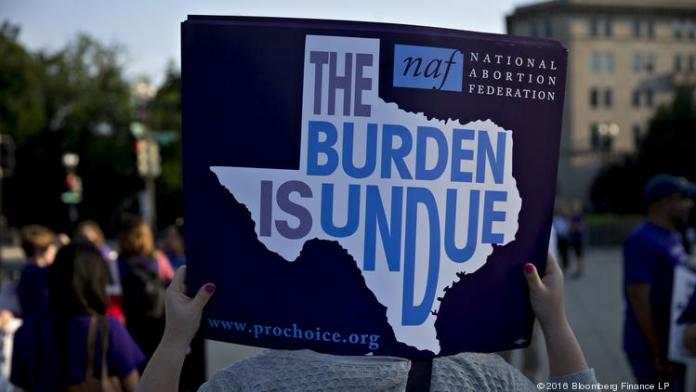This article was produced by Local Peace Economy, a project of the Independent Media Institute.
The ghastliness of the new Texas abortion law is difficult to express in words. It prevents women from aborting their pregnancies after six weeks and creates legal avenues for the punishment of those who assist a woman in her efforts to obtain an abortion. Texas has opened a multidimensional Pandora’s box that threatens marginalized communities across the country.
A future without Roe v. Wade has been thrown more sharply into focus. The emergence of abortion bounties in Texas begs the questions of where else these bounties might be collected and which other constitutional rights may be subject to vigilantism. The Supreme Court, which now has a decisive conservative majority, refused to weigh in on the constitutionality of the new law. Many have described the Supreme Court’s decision as both secretive and “cowardly” for its arrival in the dead of night and with minimal explanation. Whatever the label may be, the decision by the Supreme Court has left American women within Texas and throughout the country more vulnerable than they were just a few months ago. While lawyers may be responsible for constructing the Texas abortion law, lawyers may also be best positioned to thwart its aims even as it remains good law.
The Texas law permits abortion bounty hunters to sue those who “knowingly [engage] in conduct that aids or abets the performance or inducement of an abortion.” A $10,000 bounty at a minimum awaits successful plaintiffs on the other side of litigation.
Navigating lawsuits requires meeting deadlines, responding to motions, submitting discovery requests, advancing legal arguments, and understanding rules of civil procedure and evidence. Such complex tasks, which must be completed in order to succeed, will undoubtedly require legal representation. Crucially, however, because the lawsuits are challenged in civil court, plaintiffs have no constitutional right to free legal representation. Abortion bounty hunters seeking their bounties will turn to private attorneys in Texas for legal assistance. Principled lawyers throughout the state should decline to take these cases.
Lawyers who refuse to represent abortion bounty hunters could mitigate the harms specifically prevented by abortion bounties without having to wait for the legislative process or the judicial process to work. The calculus is simple: Abortion bounty hunters who are rebuffed over and over again may eventually decline to litigate. Those who decide to represent themselves are far less likely to be successful in court. If this practice is carried out successfully by lawyers, it might serve as a deterrent for those inclined to engage in abortion bounty hunting.
Some may argue that this proposal is unethical and unprecedented in itself. On the contrary, this is simply lawyering. Discretion is inherent in the legal profession. Lawyers decline cases consistently. Personal ethics can factor into those decisions.
Furthermore, there is a precedent for selective lawyering. At the dawn of the civil rights movement, civil rights lawyers meticulously selected cases that they thought would be best suited to challenging racial segregation and discrimination. The NAACP Legal Defense and Education Fund, which led the legal assault on racial disparities during the movement, strategically confronted school desegregation, from Missouri ex rel. Gaines v. Canada to Brown v. Board of Education, believing that deconstructing this form of racism was necessary to unsettling state-sanctioned discrimination. Just as the civil rights movement called for lawyering that could be dynamic, aggressive, and persistent in taking cases, responding to the political moment created by the Texas abortion law may call for the same kind of lawyering in declining cases.
To be sure, there are other, perhaps more conventional, efforts underway to oppose the Texas law. The Department of Justice challenged the constitutionality of the Texas law in federal court on October 18. While the Supreme Court again refused to “immediately block” the Texas law, it could take months for this case to wind its way through a federal docket and reach a final conclusion. Congressional Democrats are working to protect abortion rights with legislation, but, with the pace at which federal legislation progresses, such a bill could take years before it even comes to a vote in Congress. There is no guarantee that after the 2022 midterm elections Democrats will even be in a position to usher such legislation through Congress. Polling on the Democrats’ chances of retaining control of Congress at this point certainly does not give the party much to be excited about. Furthermore, as a corollary, there is no guarantee that a Democratic president would occupy the White House to sign such a bill into law after 2024.
Each of those avenues is premised on the luxury of time. The harms of the Texas law could spread in the meantime. Countless women are being deprived of their constitutional right to abort their pregnancies. Indeed, some Texas facilities that perform abortions temporarily stopped performing abortions altogether out of fear of the legal liability that they could incur as a result of the law.
Fear could also prevent women from seeking abortions in the first place out of concern that they might expose their families and friends to legal jeopardy. And while the law brings fear to some, it could bring profit to others—abortion bounty hunters who stand to earn millions of dollars off of Texas women, their loved ones, and anyone who (knowingly or unknowingly) helps them obtain an abortion. Other states could adopt similar schemes. Republican officials in Arkansas, Florida, and South Dakota have expressed interest in using the Texas abortion law as a model for new abortion legislation in their states.
Lawyers who decline to represent abortion bounty hunters have the power of relative immediacy on their side.
Undoubtedly, there will be those who want to pursue abortion bounties, so there will also be lawyers who will help them do so. Lawyers who refuse to help plaintiffs collect abortion bounties, should similarly be prepared to help defendants pro bono.
The new abortion law will most directly harm low-income women and women of color. Because those who are likely to help facilitate a woman’s abortion will inevitably be members of her social network, they are also likely to be in the same socioeconomic bracket due to social forces like redlining and intergenerational poverty. Even those who may help a woman get an abortion without knowing her, like rideshare drivers, are likely to be low-income as well. In other words, the burden of this law will fall most heavily on some of the most vulnerable Texans. These defendants would have the hardest time affording legal representation and the most to lose financially if they are legally required to pay bounties. Indeed, what makes the abortion law so insidious is that it leverages economic inequities to frighten women into maintaining unwanted pregnancies and intimidates those who would otherwise help them. Representing these defendants pro bono could simultaneously strike a blow for abortion rights and weaken the grip of classism.
The cruelty of situating the battle for abortion rights in the civil court system could lead to the downfall of the Texas abortion law. Because the success of the law effectively hinges on navigating the legal system, lawyers are best positioned to oppose it. They could single-handedly blunt the impact of the Texas law.
Related posts:
Views: 0
 RSS Feed
RSS Feed

















 November 2nd, 2021
November 2nd, 2021  Awake Goy
Awake Goy 




 Posted in
Posted in  Tags:
Tags: 
















